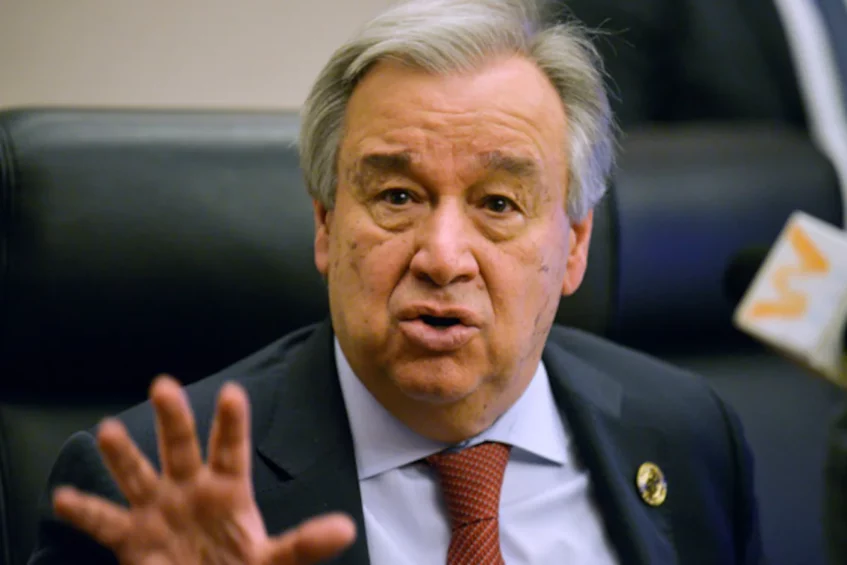
UN Secretary General Antonio Gutteres. ( Photo: Courtesy).
The UN Secretary-General is calling on governments to grant freedom of the media and expression as the world marks International Day of Democracy on Thursday.
António Guterres said democracy is backsliding and civic space is shrinking across the world, warning that without a free press, democracy cannot survive.
In a statement ahead of International Democracy Day, the UN chief called on governments around the world, including South Sudan to join forces and secure freedom and protect the rights of all people and everywhere.
“Democracy is backsliding, civic space is shrinking. Distrust and disinformation are growing. And polarization is undermining democratic institutions. Now is the time to raise the alarm,” he said.
This year’s Democracy Day discussed the importance of media freedom to democracy, peace, and delivering on the Sustainable Development Goals.
According to Reporters Without Borders, South Sudan ranked 139 out of 180 countries on the press freedom index in 2021, a statistics that saw observers describing South Sudan as one of the most dangerous places in the world to be a journalist.
A report by the UN Commission on Human Rights, key ingredients to democracy such as free, independent and pluralistic media have been severely restricted in South Sudan since the country’s independence.
Speaking on Wednesday, UN Secretary-General Gutteres appealed to world leaders to stand with those striving to secure the rule of law and promote full participation in decision-making.
“Now is the time to reaffirm that democracy, development, and human rights are interdependent and mutually reinforcing. Now is the time to stand up for the democratic principles of equality, inclusion, and solidarity,” the peacekeeping official said.
“Media workers face censorship, detention, physical violence, and even killings – often with impunity. Such dark paths inevitably lead to instability, injustice and worse. Without a free press, democracy cannot survive. Without freedom of expression, there is no freedom.”
In February last year, Amnesty International revealed in a report that South Sudan’s National Security Service uses abusive surveillance to terrorize journalists, activists, and government critics.
The government has refuted the reports, and insists that it accords freedom of the press in South Sudan, even as Reporters Without Borders also found that several journalists have over the last three years sought refuge outside South Sudan to escape the harassment.
In August last year, Vice President for Economic Cluster directed government institutions to ensure access to information and the freedom of media, for South Sudan to prosper.
Dr. James Wani Igga said the media and activists provide the government with views necessary for reforms, and called on grassroots leaders to open civic space and be tolerant to public views in their respective administrative areas.
Commenting on the event, some members of the public have described the level of democracy in South Sudan as low and called for freedom of expression and that of the media.
“In the context of South Sudan it was lack of democracy that caused 2013 war which still exist till now. To improve this, let us really accept people views and follow the law,” said James Duor, a regular commentator on Eye Radio programs.
“The laws provide the way forward but if laws are not respected and put in good manner, everything will remain in fragility.”
“Democracy cannot be implemented in South Sudan unless “we implement rule of law and respect the constitution,” said Franco Sebit.
“There is a need for respect of law, freedom of media and journalists and also freedom of expression, this is the real democracy that we need in this country,” he added.
The International Day of Democracy provides an opportunity to review the state of democracy in the world.
UNESCO reported that 85 per cent of the world’s population experienced a decline in press freedom in their country in the past five years.
It said media globally are increasingly facing attacks, online and offline, increasing detention; the use of defamation laws as well as cybersecurity or hate speech laws to curb online expression; the growing use of Strategic Lawsuits Against Public Participation Laws and surveillance technologies; to target them and hamper their work.
UNESCO added that attempts to silence journalists are growing more brazen by the day and they often pay the ultimate price.
It disclosed that from 2016 to the end of 2021, it recorded the killings of 455 journalists around the world, who either died for their work or while on the job.
Support Eye Radio, the first independent radio broadcaster of news, information & entertainment in South Sudan.
Make a monthly or a one off contribution.
Copyright 2024. All rights reserved. Eye Radio is a product of Eye Media Limited.